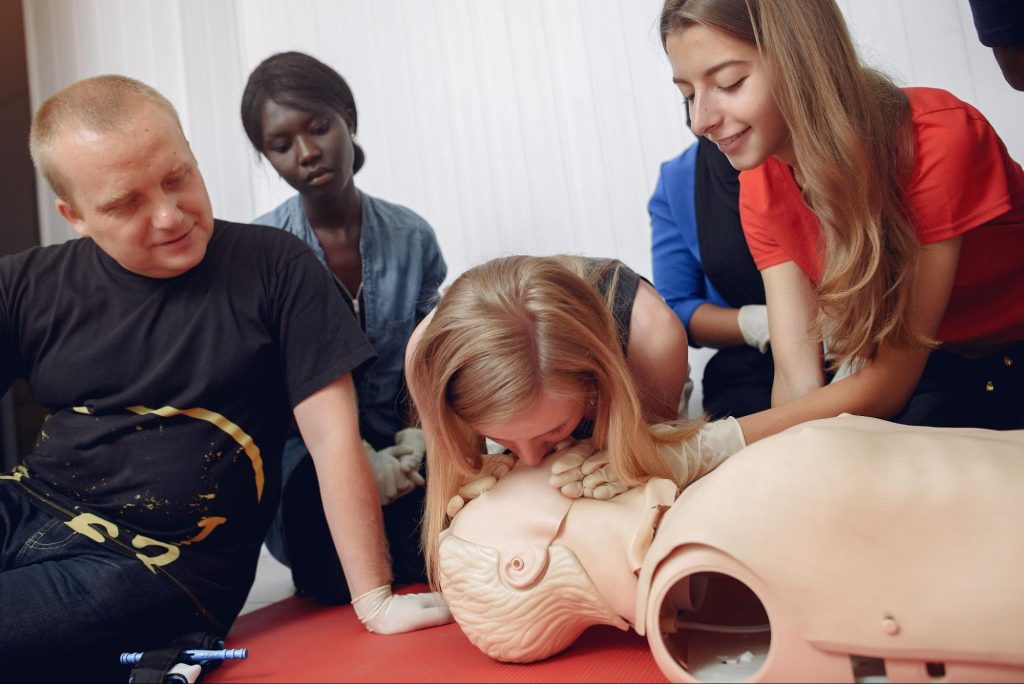
Cardiopulmonary Resuscitation (CPR) stands as a critical life-saving skill that holds immense value across various facets of society. It is not merely confined to medical professionals; rather, its importance resonates with individuals from all walks of life. In this blog post, we will explore the question, “Who needs CPR training?” and shed light on the diverse range of people who can significantly benefit from acquiring this invaluable skill.
The need for CPR training extends far beyond the realm of healthcare professionals. From parents and educators to community volunteers and travelers, individuals from diverse backgrounds can immensely benefit from acquiring this life-saving skill. By investing in CPR training, individuals not only enhance their own preparedness but also contribute to building safer and more resilient communities where prompt and effective response to emergencies becomes a shared responsibility.
CPR training is crucial for non-healthcare professionals because it equips them with the skills needed to respond effectively to life-threatening emergencies in various settings, such as homes, workplaces, and public spaces. Prompt initiation of CPR by bystanders significantly increases the chances of survival for individuals experiencing cardiac arrest or other medical crises.
CPR training should ideally be refreshed every two years to ensure that individuals maintain proficiency in the latest techniques and guidelines. Regular training and skill reinforcement help prevent knowledge decay and ensure that responders can confidently and effectively administer CPR when needed.
Yes, CPR training programs can be tailored to address the unique needs of different environments and populations. For example, specialized CPR courses are available for childcare providers, educators, workplace personnel, and healthcare professionals. Additionally, training can be adapted to focus on scenarios such as performing CPR on infants, children, or individuals with disabilities.
If you witness someone collapse suddenly and they are unresponsive, the first step is to check for signs of breathing and a pulse. If there is no breathing or pulse, immediately call emergency services and begin CPR by performing chest compressions at a rate of 100 to 120 compressions per minute. If an automated external defibrillator (AED) is available, follow the device’s instructions for use.
Yes, CPR training can be beneficial in various emergency situations beyond cardiac arrest. CPR techniques, including chest compressions and rescue breaths, can be used to assist individuals who are choking, experiencing drowning, or suffering from drug overdose until professional medical help arrives. The skills acquired through CPR training empower individuals to respond confidently to a range of medical emergencies.
Absolutely. CPR training is designed to be accessible to individuals with diverse backgrounds and skill levels, regardless of prior medical experience. Trainers provide step-by-step instruction and hands-on practice to ensure that participants feel comfortable and capable of performing CPR techniques effectively in real-life situations.
CPR training courses are offered by various organizations, including the American Heart Association (AHA), the American Red Cross, and local healthcare providers or community centers. Interested individuals can search online for accredited CPR training programs in their area or inquire with local healthcare facilities and organizations offering CPR certification courses.
In addition to the immediate benefits of acquiring CPR training, such as the ability to respond confidently in emergencies, there are broader societal impacts that stem from widespread CPR education. By fostering a culture of preparedness and proactive response, CPR training contributes to the overall safety and well-being of communities.
One significant impact of widespread CPR training is the potential to save lives beyond those directly trained. When more individuals within a community are equipped with CPR skills, the likelihood of someone nearby being able to intervene during a medical emergency increases substantially. This collective readiness forms a safety net that can make a critical difference in situations where every second counts, such as sudden cardiac arrest.
Moreover, CPR training promotes empowerment and confidence among individuals. Knowing that one possesses the ability to intervene effectively in a life-threatening situation instills a sense of empowerment and self-assurance. This confidence not only translates to a greater willingness to take action during emergencies but also extends to other areas of life, fostering resilience and a proactive mindset.
CPR training catalyzes broader public health initiatives. It raises awareness about the importance of cardiovascular health, early recognition of symptoms, and the need for timely intervention. As individuals become more informed about risk factors for cardiac arrest and other medical emergencies, they are better equipped to advocate for preventive measures, such as access to defibrillators in public spaces or initiatives promoting healthy lifestyle choices.
Additionally, CPR training fosters community cohesion and mutual support. As individuals come together to learn life-saving skills, they strengthen social bonds and foster a sense of collective responsibility for each other’s well-being. This sense of community solidarity can have far-reaching effects, creating networks of support that extend beyond emergencies to encompass broader issues affecting community health and safety.
In essence, CPR training transcends its immediate life-saving capabilities to become a cornerstone of resilient and compassionate communities. By equipping individuals with the knowledge and skills to respond effectively to emergencies, CPR training not only saves lives but also fosters a culture of preparedness, empowerment, and community engagement. As more people recognize the value of CPR education and commit to being proactive agents of change, the ripple effects of this life-saving skill will continue to strengthen the fabric of society for generations to come.
In conclusion, CPR is not just a skill. it’s a vital asset that empowers individuals to become proactive lifesavers within their communities. By investing in CPR certification training, you not only enhance your preparedness but also contribute to building safer and more resilient neighborhoods where every person has the potential to make a life-saving difference. Take the first step towards becoming a certified responder today by exploring CPR classes near you. Together, let’s make our communities safer and more prepared for emergencies.